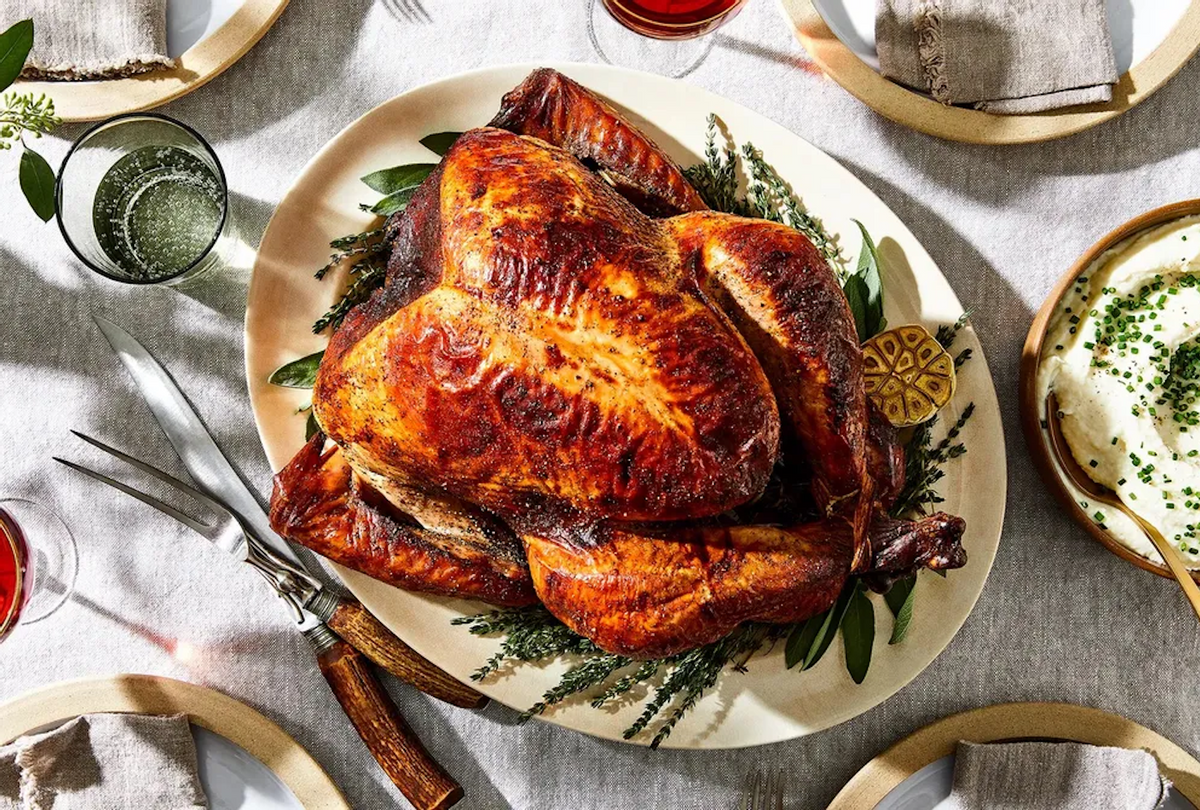By now we're probably all familiar with the idea that eating turkey induces sleepiness. After hours of making our way through mounds of mashed potatoes, cups of cranberry sauce, pounds of roasted parsnips and carrots, spoonfuls of sweet potato casserole, and slice after slice of pumpkin pie, who wouldn't want a nap? Any large amount of food is bound to make you feel stuffed and sleepy. But what is it about turkey that makes you so dang tired on Thanksgiving? I've been known to blame many a post-Thanksgiving nap on "all that tryptophan," an amino acid found in turkey and other protein-rich foods that is said to cause an intense desire for slumber. It's a common experience: gorging on plates full of Thanksgiving fare, only to retreat to the sofa, satisfied but sleepy, blinded by the desperate need for a nap.
But how much of this comfortable myth is couched in reality? To what extent should you blame the turkey for these post-feast fits of fatigue? I set out to do some (light) research on how sleep-inducing foods affect our serotonin levels.
Catching some ZZZs
It turns out the answer to why turkey makes us feel sleepy is more accessible than I previously thought; this is no new query. A bevy of other outlets have taken the chance to test this theory. Scientists have spoken and the internet has reported and the conclusive, almost across-the-board answer is that turkey, what with its trace elements of tryptophan, is actually not to blame for any type of post-Thanksgiving meal dreariness. Turkey is not actually the food that will boost serotonin production either. And here's why:
Let's start at the beginning. Tryptophan is an amino acid that, once consumed, is a chemical antecedent to the body's natural production of melatonin and serotonin, two compounds that regulate our sleep cycles. Turkey does in fact contain tryptophan—there's no denying that. But so do a host of other meats like chicken and beef. Furthermore, nuts and cheeses actually contain even higher levels of tryptophan. Not to mention that tryptophan is only one of the twenty amino acids found in the bird.
Instead, we can attribute our fatigue to the carbohydrates that populate our Turkey Day buffets. Carbs release insulin which allows for tryptophan to enter our brains at a higher rate. So it's actually this intense overload of potatoes and stuffing (combined with the tryptophan in many of the foods we eat) that has our eyes feeling heavy. And those glasses of red wine. And bourbon. And cocktails. Well, they definitely don't help, either.
So there you have it: tryptophan is part of the equation, but turkey is not entirely at fault. Any big meal chock-full of those carbs is bound to make us feel tired. So as you drift off to sleep with a tummy full of turkey, blame some of those other classic Thanksgiving dishes instead.
How to avoid being tired on Thanksgiving
Although the most obvious answer is to "just eat less food" on Thanksgiving to avoid getting tired, that's really not going to do you or I much good. Frankly, I have no interest in piling less food onto my plate on Turkey Day. But all hope isn't lost. Experts say that taking a walk after eating a large meal can help aid digestion, which will help keep you from feeling bloated and drowsy. Plus, that chilly November air will certainly wake you up, too.
It may be tempting to skip breakfast and lunch to save room for the big feast, but experts say that this may result in overeating during Thanksgiving dinner. So take care to eat nourishing, vegetable- and protein-rich foods throughout the day.
If your Thanksgiving table is packed tightly with bowls of sautéed and roasted vegetables like Glazed and Glistening Haricot Verts or this beautiful Roasted Delicata Squash with Spicy Yogurt Dressing and Pomegranate, grab an extra helping or two. Health experts at The University of Pittsburgh Medical Center say that eating lots of veggies can cause a slower rise in insulin levels than carbs like dinner rolls and mashed potatoes, which will keep you energized for longer.




Shares